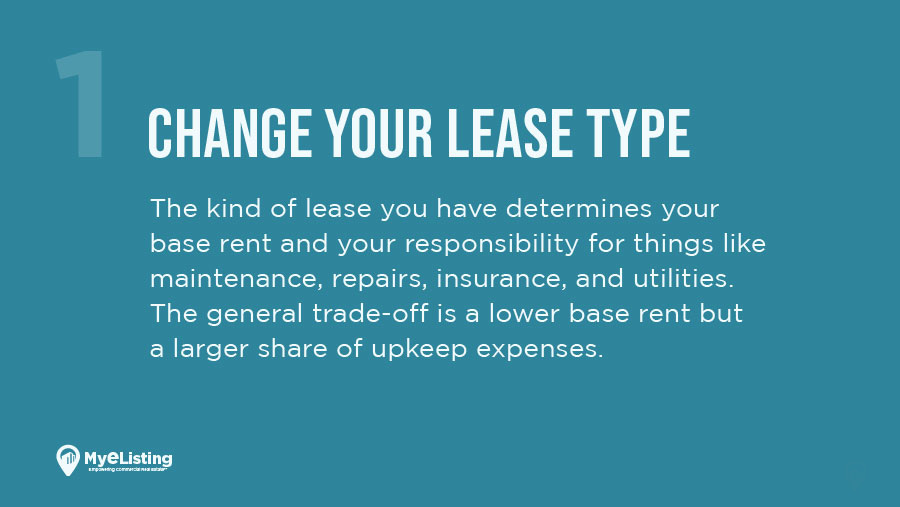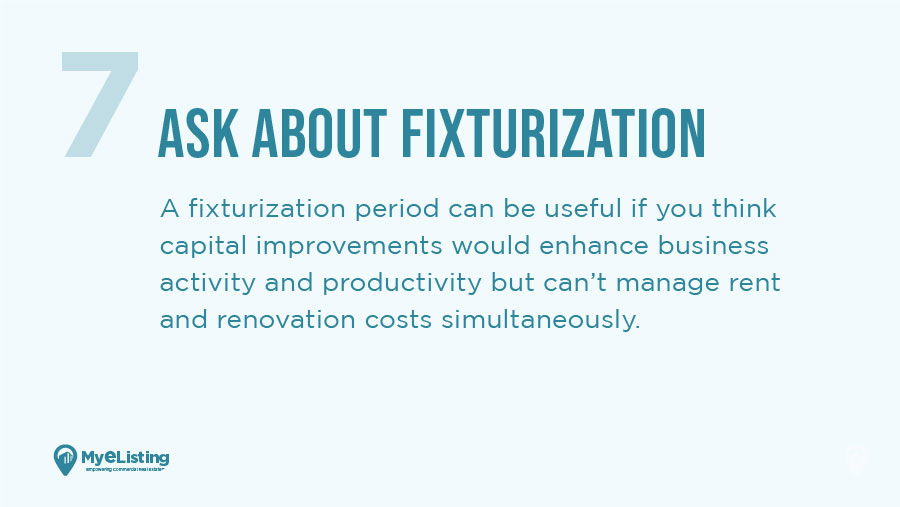How to Renegotiate Commercial Lease Terms

Specializes in providing actionable insights into the commercial real estate space for investors, brokers, lessors, and lessees. He covers quarterly market data reports, investment strategies, how-to guides, and top-down perspectives on market movements.

The economy has been hard for everyone lately, especially businesses. If your business has a commercial lease, the changing economic landscape might mean you are no longer getting a deal that meets your financial needs and plans for growth.
The typical commercial lease is “5 and 5,” meaning a five-year lease with an option to renegotiate for five additional years at the end. The end of a commercial lease is a great time to reassess your needs as a tenant and renegotiate your lease for more favorable terms.
Fortunately, we are on your side. Let’s cover some useful strategies on how to renegotiate commercial lease terms to get a better deal.
#1 – Change Your Lease Type

The kind of lease you have determines your base rent and your responsibility for things like maintenance, repairs, insurance, and utilities. The general trade-off is a lower base rent but a larger share of upkeep expenses.
The main types of commercial leases include:
- Single-Net. In a single net lease, the tenant pays only utilities and property taxes while the landlord handles repairs, insurance, and maintenance costs.
- Double-Net. With a double-net lease, tenants pay for property taxes, utilities, and insurance. The landlord covers repairs and maintenance.
- Triple-Net. In a triple-net (NNN) lease, the tenant pays for all building costs except structural repairs.
- Modified Gross Lease. In a modified gross lease, landlords and tenants share some previously agreed-upon portion of building expenses.
If your financial situation has changed, renegotiating a net or gross lease you have might be a good idea. For example, paying a set monthly premium to have the landlord handle taxes, insurance, maintenance, and repairs can help make budgeting more efficient and predictable if revenue is strained.
#2 – Reassess the Cure Period
Commercial leases have cure periods that determine how long tenants have to rectify lease breaches. For example, a commercial lease might have a cure period of a day or two for late rental payments.
Cure periods protect tenants because they give some flexibility in meeting tenant obligations. A cure period should be a non-negotiable part of the lease.
#3 – Consider a Co-Tenancy Clause
If you are a retail business in a multi-tenant space, it can be worth researching a co-tenancy clause. Co-tenancy clauses allow you to break your lease or pay a lower base rent if larger tenants you rely on for traffic vacate the premises.
Co-tenancy clauses are popular in multi-tenant buildings because they can let businesses break the lease without penalty if the retail ecosystem starts to break down.
#4 – Research Subleasing
Subleasing involves the tenant renting part of their space to a sub-tenant. If you do not already have the option of subleasing in your current lease agreement, you should negotiate a sublease clause when you renew.
If you expect to have some financial difficulties in the near future, subleasing can help you retain your space and recoup some lost revenue in the form of rent.
#5 – Propose Temporary Income Sharing
Both tenants and landlords need to generate income from the space that businesses lease. In uncertain market conditions, it can be hard for both parties to gain. With a temporary income-sharing arrangement, tenants split part of their income with landlords in exchange for reduced or eliminated rent. Income-sharing agreements can generate funds for both parties.
Most income-sharing agreements have a base gross income, after which the tenant pays a specific percentage of sales. The typical industry standard percentage for income-sharing is about 7%. If funds are tight, but you expect business to pick up soon, you can offer a temporary income-sharing agreement in exchange for a rent reduction or rent abatement.
#6 – Negotiate a New Force Majeure Clause
A force majeure clause is a stipulation in a commercial lease that excuses or delays tenants’ obligations under certain conditions. Force majeure clauses usually take the form of reduced rent payments in the event of unforeseen circumstances, such as disasters, strikes, or political unrest.
Many businesses discovered the importance of force majeure clauses during government-initiated lockdowns through 2020 as they fought with landlords over rental payments. A comprehensive force majeure clause that is sensitive to your specific situation can protect you in situations out of your control.
#7 – Ask About Fixturization

If you have been in your space for an extended time, odds are it needs some repairs or renovations, whether it’s something small like hanging new light fixtures or a large project like expanding the space.
Generally, landlords perform structural repairs and improvements while tenants pay rent. However, tenants can ask for a fixturization period, in which they pay for repairs/renovations in exchange for free rent.
For example, if your office needs in-depth plumbing work, you can renegotiate your lease with a fixturization period of 120 days to give you enough time to acquire the necessary permits and licenses for construction.
A fixturization period can be useful if you think capital improvements would enhance business activity and productivity but can’t manage rent and renovation costs simultaneously.
#8 – Hire A Tenant Agent
If you are uncomfortable renegotiating a lease on your own, you can hire a tenant agent for assistance. Tenant agents are specialized experts who negotiate commercial leases on behalf of business tenants.
Aside from general lease advice, a tenant agent can help you go over a specific lease agreement and identify clauses and conditions you may not notice.
#9 – Have Alternative Options
Lastly, you should never put all your eggs in one basket when it comes to renegotiating your lease. Having a Plan B and C should always be a priority in case your Plan A falls through.
For instance, you might reach the end of lease renegotiations but encounter an insurmountable stumbling block. In that case, you want to have alternative options on the table, so you won’t have to scramble for a solution.
Find & Connect With Commercial Agents & Brokers Near You for Free on MyEListing.com
MyEListing.com maintains one of the largest databases of commercial agents & brokers in the country. Use it for free to find and connect with an agent or broker near you.
Article Search
Share
All Article Categories








